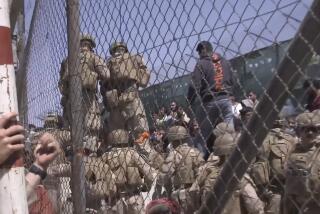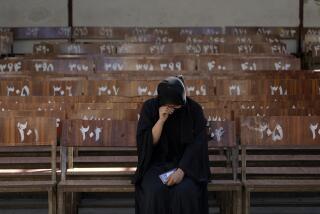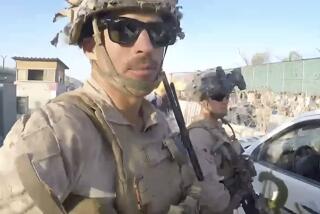Taliban says Cheney was bomb target
WASHINGTON — U.S. and Afghan officials are investigating whether Taliban fighters who have claimed responsibility for a suicide bombing Tuesday at Bagram air base were tipped off that Vice President Dick Cheney was visiting there.
Cheney, who was staying a mile from where the bomb exploded, was not injured in the attack at the gate of the sprawling base.
A U.S. soldier and a South Korean soldier were among those killed. Reports of the death toll varied, with the U.S. military saying nine people died and the Afghan government reporting 23 dead and 24 injured. An American contractor also was reported killed.
The attack came as concern is growing about the increasing ability of the resurgent Taliban and the tenuous stability of the U.S.-backed government in Afghanistan. The possibility that insurgents knew of a secret visit by a top U.S. official and were able to launch an attack would cast the conflict with the militant movement in a troubling new light.
The Taliban claimed responsibility for the bombing. Mullah Hayat Khan, a Taliban commander, told Reuters news agency that Cheney was the target.
Government and congressional officials expressed doubt that the Taliban could have learned of the vice president’s presence on the base and devised an attack so quickly.
“At this point, it simply isn’t clear that it was known that Cheney was there,” said a U.S. intelligence official, who, like others, spoke on condition of anonymity in discussing the investigation.
American officials also suggested that the Taliban would have attempted a more aggressive attack had it known Cheney would be at Bagram, about 25 miles north of Kabul, the Afghan capital.
“If you were in the Taliban’s sandals or shoes, wouldn’t you have used rockets and mortars?” asked a second U.S. intelligence official. “If you knew that this thing was happening, that the vice president was going to be there at that time, couldn’t you have just brought up 30 or 40 guys and a truck?”
Cheney told reporters traveling with him that he heard a “loud boom.” After the explosion, he was briefly moved to a bomb shelter before returning to his quarters.
Cheney said he was not aware of the Taliban’s claim of responsibility but said such attacks were aimed at undermining the Afghan government.
“I think they clearly try to find ways to question the authority of the central government,” Cheney said. “Striking at Bagram with a suicide bomber, I suppose, is one way to do that, but it shouldn’t affect our behavior at all.”
Cheney, traveling with the CIA’s No. 2 official, arrived at Bagram late Monday afternoon after talks with Pakistani President Pervez Musharraf in Islamabad.
Deputy CIA Director Stephen Kappes accompanied Cheney to Pakistan to ensure that the vice president “had all the current information” as he pressed Musharraf for greater cooperation in fighting Al Qaeda, Director of National Intelligence J. Michael McConnell said in Senate testimony Tuesday.
The stops in Islamabad and Kabul were unannounced for security reasons, and Cheney made no public statement or appearance in either capital. The suicide bombing occurred as the vice president was preparing for a meeting with Afghan President Hamid Karzai, which had been rescheduled because of weather.
The security situation in Afghanistan has been deteriorating over the last year. The number of suicide blasts nationwide rose to 140 in 2006 from 30 in 2005, and the number of roadside bombings grew to 1,600 from 780, military officials say.
Pentagon spokesman Bryan Whitman acknowledged that the Bagram blast was an “aggressive attack” and said military officials had not determined whether security had been breached.
The last time militants attacked Bagram’s entrance was in July, when a roadside bomb exploded just outside the gate, said Sgt. James E. Wilt, a military spokesman in Afghanistan.
Security problems have arisen at the base before. Last year, The Times was able to purchase computer drives containing classified military information at local markets nearby. The drives had been stolen from the base.
White House Press Secretary Tony Snow said there were too few facts to be able speculate on what happened or how the attacker was able to get so close to the base.
“People are still investigating what happened,” Snow said. “So we don’t have a firm answer for you.”
Some Afghanistan experts cast doubt on the Taliban’s skills at collecting intelligence and said the militants were hardly capable of tracking the movements of someone such as Cheney, who was traveling under heavy security.
“I am inclined to think it was a coincidence,” said one congressional staffer who has studied Afghanistan. “Dick Cheney didn’t intend to stay over. And I don’t think the Taliban has the level of human intelligence to know what goes on at an American base.”
But even if the timing of the attack was a fluke, the fact that insurgents were able to carry it out was telling, said Derek Chollet, a fellow at the Center for Strategic and International Studies in Washington.
“It’s a symbol of a larger trend,” Chollet said. “The insurgency is growing more significant. Most people expect, in at least the short term, it is going to get worse in Afghanistan before it gets better.”
The U.S. recently added about 3,000 troops to Afghanistan, raising its deployment to 26,000. American officials have asked North Atlantic Treaty Organization allies to increase their troop contributions as well. NATO and other allies have 35,000 troops in the country.
Defense Secretary Robert M. Gates has pledged to launch a “spring offensive” in an attempt to neutralize the Taliban.
Experts believe Taliban members have taken refuge in neighboring Pakistan.
Pakistan’s inability to stop the Taliban’s cross-border forays was the main focus of Cheney’s meeting with Karzai, an Afghan government official said.
Afghanistan and Pakistan have been in a diplomatic battle over who bears responsibility for Islamic militants’ crossing of their porous border. Pakistan says NATO and Afghan troops have not done enough to police the frontier; Afghan officials say militants have found haven in the tribal lands on Pakistan’s side of the border.
The latter view has been gaining currency in U.S. intelligence circles. In his talks with Musharraf, Cheney expressed concern about the possible regrouping of Al Qaeda elements in the tribal lands.
Musharraf told him that Pakistan was doing all it could to prevent insurgents from crossing into Afghanistan to stage attacks. But the Pakistani president has been sharply criticized over a pact struck last year with tribal elders in North Waziristan, a volatile border area, that in effect left the area unpoliced by Pakistani troops.
*
Barnes and Meyer reported from Washington and King from Peshawar, Pakistan. Times staff writers James Gerstenzang, Greg Miller and Peter Spiegel in Washington and special correspondent Shafiqullah Azimi in Kabul contributed to this report.
More to Read
Sign up for Essential California
The most important California stories and recommendations in your inbox every morning.
You may occasionally receive promotional content from the Los Angeles Times.










